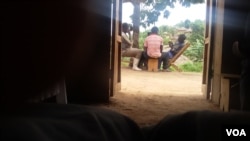More than 700 members of the Rwandan rebel group FDLR surrendered in the Democratic Republic of Congo during 2015, according to the United Nations. The U.N. mission in the DRC says many of those who gave themselves up were in poor health and a high proportion are children.
Estimates of the total number of FDLR fighters in Congo this year have varied between 1,500 and 2,500.
In October, a group of U.N. experts on the DRC reported that 339 of the group’s combatants had been captured or had surrendered over the first eight months of the year.
But this week, the U.N. mission in the DRC, MONUSCO, reported a surge in surrenders. The head of MONUSCO’s disarmament, demobilization and reintegration (or DDR) section, Taz Greyling, announced the news at a year-end news conference.
She said that from the start of the year up to December, 710 FDLR members have been disarmed and demobilized, of whom 315 were children.
The rate of surrenders has accelerated since October and those coming forward are in very bad physical and mental condition, she added.
MONUSCO has also seen an increase in the number of wounded FDLR dependents, Greyling said.
She appealed to the FDLR and other armed groups to move their families away from the combat zones, and said MONUSCO and humanitarian agencies stand ready to help treat wounded dependents.
Analyst Jason Stearns of the Congo Research Group questioned how many FDLR fighters were really turning themselves in.
He told VOA that many people close to the disarmament process suggested the surrendering combatants the U.N. was talking about may have been sick or unfit combatants, or may not have been combatants at all, but Congolese civilians arrested by the authorities.
Stearns added that the FDLR cannot yet be written off.
They definitely retained a capacity for military operations, he said, and were by far the largest and most dangerous armed group still in eastern Congo. Largely speaking, their command structure and hierarchy has not been affected by demobilization, he said.
A Congolese expert on demobilization, Didier Bitaki, suggested on local radio recently that some Rwandan rebels may have claimed to be Congolese when they surrendered and so may not have been counted as FDLR . He called for closer monitoring of the DDR process for Congolese armed groups.




